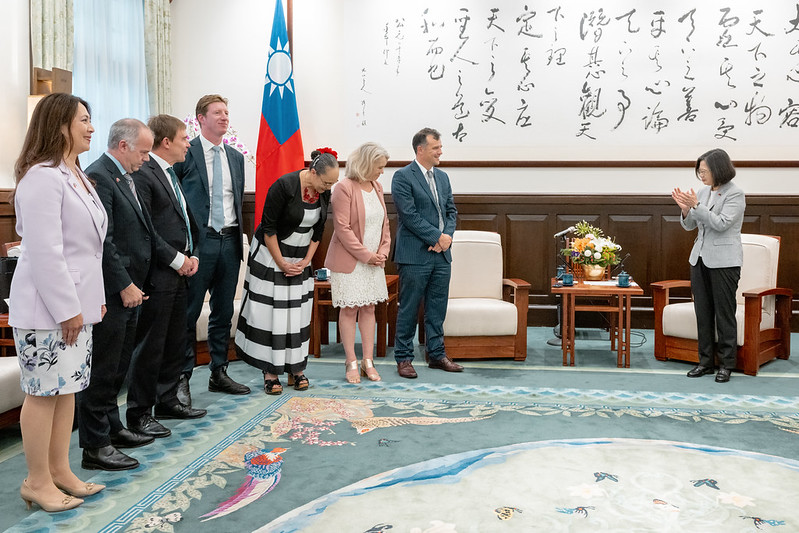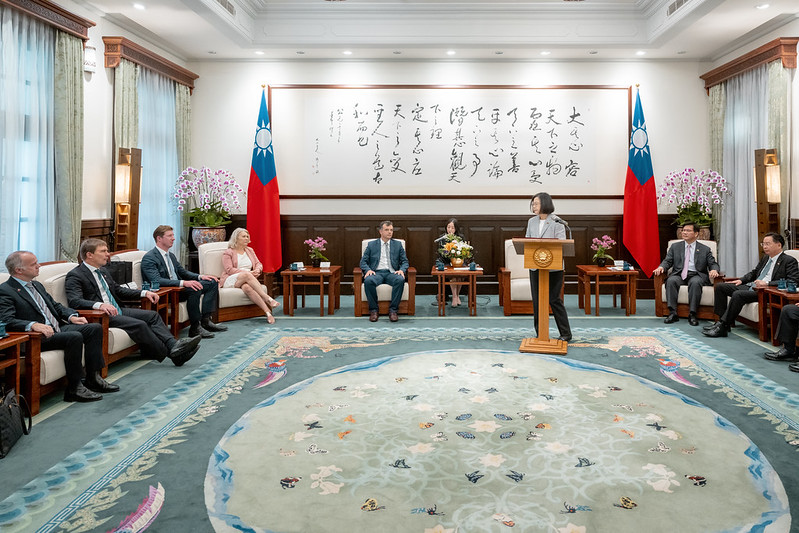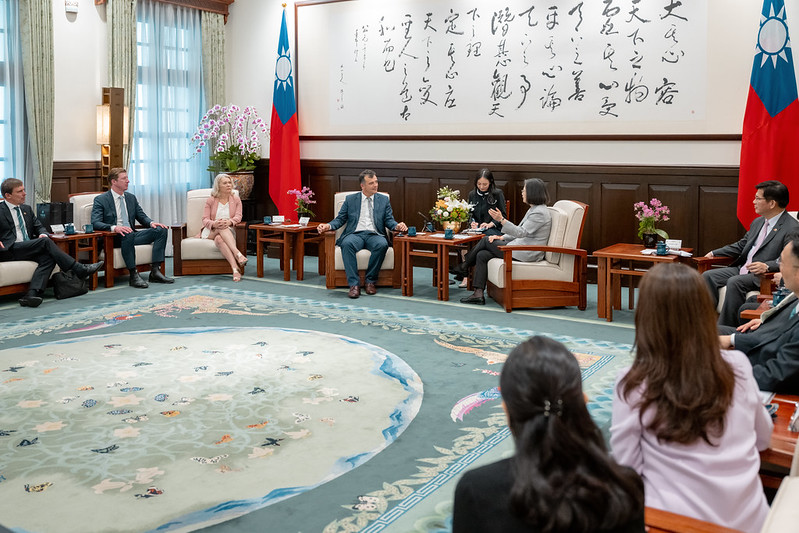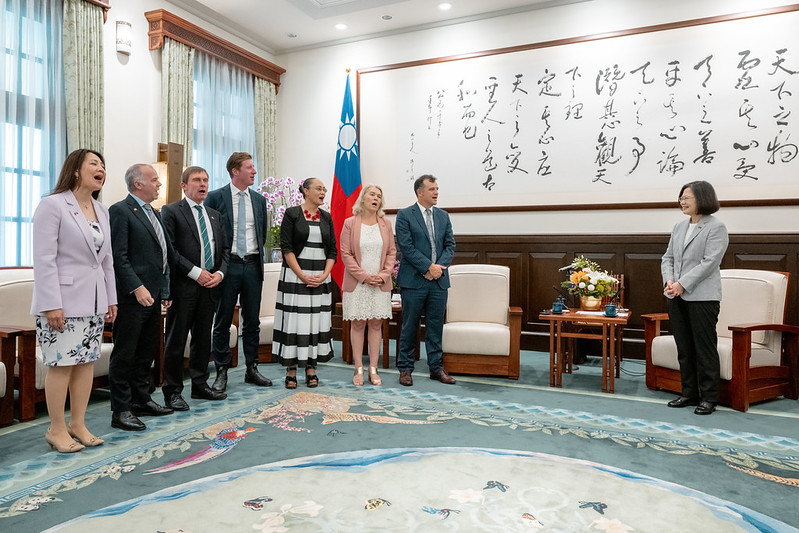News & activities
 News releases
News releases
On the morning of April 16, President Tsai Ing-wen met with a delegation from New Zealand's All-Party Parliamentary Group on Taiwan. In remarks, President Tsai stated that a great many challenges have buffeted the geopolitical landscape and economy of the Indo-Pacific. She said it is more important than ever that democracies stand as one to cooperate, and work together to safeguard regional peace and stability. The president thanked the New Zealand government for the joint statement released after the inaugural Australia-New Zealand ministerial consultations in February, which reaffirmed the importance of peace and stability across the Taiwan Strait. She said she looks forward to Taiwan-New Zealand economic and trade relations growing closer, and to both sides boosting exchanges across domains including the digital economy, indigenous culture, and clean energy to deepen our bilateral cooperation.
A translation of President Tsai's remarks follows:
New Zealand and Taiwan are democracies with a staunch belief in freedom and respect for human rights. Across political parties, our countries are committed to the pursuit of peace and prosperity. Today, I extend a very warm welcome to this cross-party delegation from the New Zealand Parliament led by Member of Parliament Joseph Mooney. And I am delighted to see Member of Parliament Ingrid Leary once again. Our guests today represent New Zealand's four major political parties. A number of you are visiting for the first time. I am confident that your experiences here will help deepen your understanding of Taiwan and benefit our cooperation and exchanges.
In recent years, a great many challenges have buffeted the geopolitical landscape and economy of the Indo-Pacific. It is more important than ever that democracies stand as one, strengthen cooperation, and work together to safeguard regional peace and stability. The joint statement released after the inaugural Australia-New Zealand ministerial consultations in February reaffirmed the importance of peace and stability across the Taiwan Strait. In addition, I would like to take this opportunity to sincerely thank MP Mooney and MP Leary for urging the New Zealand government to seriously consider the importance of security across the Taiwan Strait to New Zealand's economy and national security.
In recent years, Taiwan-New Zealand economic and trade relations have also grown closer. New Zealand cherries, kiwifruit, and dairy products are very popular here in Taiwan. Just last week, Taiwanese pineapples were approved for export to New Zealand. This is a huge international breakthrough for high-quality Taiwanese agricultural products, and a key achievement in our deepening bilateral cooperation.
In Taiwan, pineapples are a symbol of success and good fortune. I would like to thank our guests for taking action to support Taiwan. With your backing, we look forward to flourishing success for Taiwan and New Zealand in exchanges across a host of domains, including the digital economy, indigenous culture, and clean energy. In closing, I wish you all a fruitful and rewarding visit.
MP Mooney then delivered remarks, stating that the delegation included MPs from four of New Zealand's political parties: the National Party, New Zealand First, ACT, and the Labour Party, and that it is a real privilege and pleasure for them to visit Taiwan. He said New Zealand is building on a longstanding relationship with Taiwan, with our trade agreements in 2013 being the very first between Taiwan and an Organisation for Economic Co-operation and Development (OECD) country. He said it was really great to hear about Taiwan and New Zealand's respective interest in fruit, particularly his country's kiwifruit and cherries, and that New Zealand recently opened up imports of Taiwan pineapples, noting that they are fantastic.
MP Mooney indicated that Taiwan and New Zealand have also been able to touch upon the indigenous relationship between our island nations. He said the delegation visited an Atayal tribe and heard the children's amazing singing, which made them reflect on the relationship going back thousands of years in which peoples who migrated from Taiwan eventually ended up in New Zealand with its indigenous population, the Māori.
MP Mooney stated that our nations both have a deep respect and belief in democracy. He indicated that New Zealand is one of the oldest democracies in the world, while Taiwan's is more recent, which has been encouraging for the delegation to learn more about during their visit. He went on to say that both nations also believe in peace and prosperity – values that we share – and as it is an increasingly challenging time, New Zealand is very focused on maintaining that peace and prosperity in our world.
MP Mooney stated that the digital economy is becoming increasingly important globally, and that it was amazing for the delegation to visit the Hsinchu Science Park and see the innovation Taiwan has been doing, as well as Taiwan's skills and capabilities in the information and communications technology (ICT) sector. He said that ICT and digital technology are becoming more important year by year, Taiwan has a very strong place in these fields, and the partnership between academia, government, and the business sector in Taiwan was impressive to see.
Regarding President Tsai's remarks on clean energy, MP Mooney said that this is an area in which New Zealand can potentially offer more to Taiwan, as it has skills and capabilities, particularly in geothermal technology. As the delegation visited Taiwan's geothermal spas and saw impressive geothermal activity, he said, it is an opportunity for our respective nations to develop those skills and capabilities.
MP Leary then delivered remarks, beginning with the Māori greetings tēnā koe and tēnā koutou katoa, indicating these greetings come especially from New Zealand's opposition parties. Although four parties are here physically, she said, spiritually, her delegation is present with all six parties from the Parliament of New Zealand.
MP Leary then expressed condolences for the earthquake in eastern Taiwan and the pain and suffering caused, and particularly for those who passed away. She also acknowledged the resilience of Taiwan in the face of this challenge.
MP Leary went on to congratulate Taiwan on a successful presidential election. These are difficult times globally, she said, and to see the seamless transfer of power in a democracy is a great beacon of light to all of us, and something that should be cherished.
Regarding the relationship between New Zealand and Taiwan, as well as the Pacific, MP Leary acknowledged her colleague in the delegation, MP Jenny Salesa, who is from Tonga and is indigenous herself, noting that this is a relationship about continuity. Although we are gathered here for a small moment in time, she said, we are on a journey that has continued for many thousands of years, and will continue many thousands of years into the future.
MP Leary stated that the delegation recently visited an Atayal tribe, which deeply moved them. She said they also visited Taiwan's National Human Rights Museum, which showed them why Taiwan holds the values of freedom, democracy, and the rule of law so closely.
MP Leary said this visit is a continuity from her visit to Taiwan last year, as well as to colleagues in Washington, DC through her role in the Inter-Parliamentary Alliance on China (IPAC). She said New Zealand is hearing Taiwan's calls to join international fora to share Taiwan's best practice and experience, and that the delegation will continue to carry those messages back home.
Emphasizing that although Taiwan and New Zealand are a distance apart and separated by oceans, MP Leary stated that like our ancestors, we value the peace and security of those oceans. She stated that New Zealand, like Taiwan, will play their part to ensure regional peace, security, and prosperity, and looks forward to continuing this wonderful, deep, and enduring friendship over the many decades and centuries to come. MP Leary closed her remarks by thanking Taiwan once again for the generous hospitality that the delegation received.
After their remarks, the New Zealand delegation sang the Māori song "Tutira Mai Nga Iwi" to extend best wishes to Taiwan.
Also in attendance at the meeting were Members of Parliament Sam Uffindell, Andy Foster, and Todd Stephenson.












